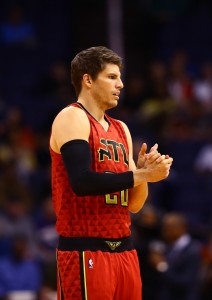Speaking to reporters for the first time since completing the trade that sent Mike Dunleavy, Mo Williams, and a first-round pick to Atlanta for Kyle Korver, Cavaliers general manager David Griffin admitted that his club had been eyeing the veteran sharpshooter for a while. According to Griffin, the Cavs looked into landing Korver last season, writes Dave McMenamin of ESPN.com.
During his conversation with reporters, Griffin also addressed LeBron James‘ recent public comments about Cleveland needing a point guard and a backup big man. Although he agrees with James on the subject of a point guard, Griffin isn’t convinced that the current roster needs more frontcourt depth. As the GM observed, the Cavs are often at their best when they’re using a smaller lineup with the Finals MVP at the four, reducing the need to add more traditional bigs to the lineup.
Here are a few more of Griffin’s most notable comments from the presser, via McMenamin and Joe Vardon of Cleveland.com:
On potentially adding a “playmaker” rather than simply targeting a backup point guard:
“It’s something where we’re all pretty keenly aware that it would help take some burden off of Kyrie [Irving] and LeBron as our primary playmaker, so if we could get somebody else that could do it … and it really doesn’t even have to be a point guard; it’s just we need playmaking. … Obviously [Tyronn Lue] has done some creative things with Kevin Love to make offense run through him as well. But all season long, we’ve known we need more playmaking and just more intelligence at times on the floor in terms of the decision-making. We’ll continue to try to improve.”
On using their $9.6MM traded player exception (expiring 2/18/17) to acquire Korver, reducing its value to $4.4MM and creating two new TPEs, when the team could’ve held onto the full $9.6MM TPE instead:
“The reason we did it is it’s highly unlikely a team that’s running our cap and tax numbers is going to be able to use the full bandwidth of that number ($9.6MM), and the number of players that fit was really small in terms of people we had any realistic expectation we could acquire. We wanted to do something where we reset the deck with a couple [trade exceptions] that were going to be usable for another year.
“It gives us the most flexibility that we can have moving forward into the summer. We’ve got a couple other [trade exceptions] that are going to expire in July. With the minimum [salaries] changing and everything else moving forward, it’s going to be hard to use those small ones because I think they are probably going to be smaller than minimum, but [team counsel] Tony Leotti and [planning director] Brock Aller are just amazing with what they do and everything with cap space. Essentially that was their creation.”
On the fact that not many teams currently view themselves as sellers:
“The teams that are identified as sellers probably didn’t have what fit us real well, so I think there are far fewer opportunities right now to make trades than there have been in the past for our team, just in terms of fit. … Hopefully that picture clears itself up a little bit by the trade deadline. Maybe some teams that are still playing for right now may end up being in a situation where they start to set the deck for the future, but we need more teams to be out of the playoff picture to really be able to get business done.”
